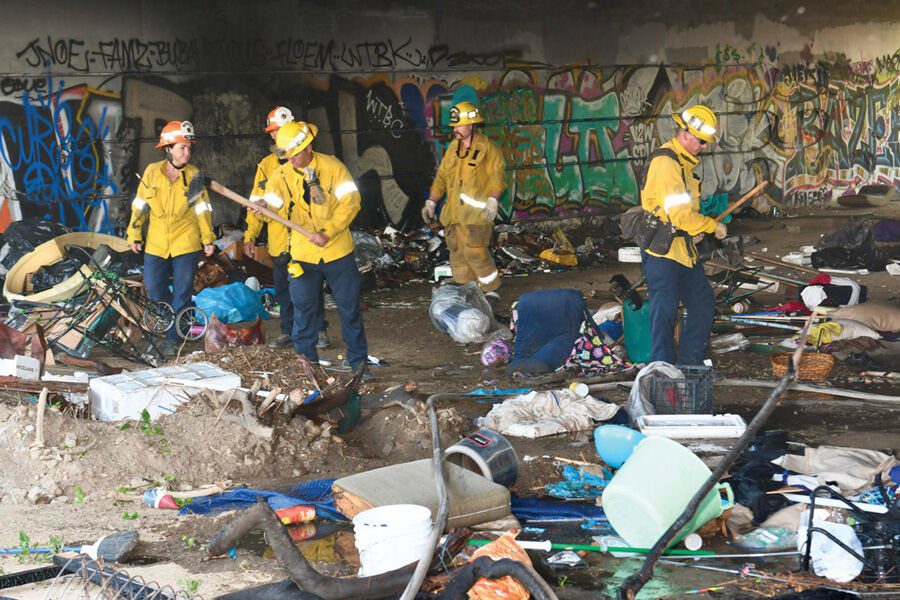
With a staggering 17 fires reportedly started by unhoused people in Malibu so far in 2021, Malibu City Council is scrambling to find a way to enforce what could effectively be considered a ban on camping—but don’t call it a ban on camping.
On Monday, council voted to declare a state of emergency due to the fires and the expectation that fire danger will increase in coming weeks, amid very low fuel moisture and with Santa Ana winds on the horizon. With the state of emergency came a resolution to ban camping in high fire risk areas.
“To prevent the occurrences of fire and loss of life and property, homeless encampments are prohibited in areas designated as a VHFHSZ [very high fire hazard severity zone] in Malibu,” the resolution, approved 5-0, stated.
As of Monday, Aug. 23, the entire City of Malibu was considered under VHFHSZ according to a staff report prepared for the meeting.
Council also discussed proposed changes to the city’s no camping ordinance that would allow the city to limit the areas where homeless people can camp based on fire danger, but took no action on the ordinance change.
The proposed ordinance “identifies certain areas where camping is strictly prohibited.” Among those are any public beach, public park or public street; any undeveloped property where camping is prohibited; and any area “within 25 feet from the public entrance to any place of business, within 200 feet of a residence, and within 1,500 feet of a day care center or public or private school or college within the city limits of Malibu.” Camping would be prohibited on property that is “within any area that the city manager, public safety manager or city council may determine from time-to-time to constitute an extreme fire danger (which may include any area designated as a VHFHSZ by CAL FIRE).”
But at the Monday city council meeting, interim City Attorney John Cotti emphasized the proposed restriction was not an all-out ban.
“The intent with this camping ordinance is not—it is 100 percent, absolutely not—to ban camping in its entirety. We can’t legally do that. We’ve had that discussion before,” Cotti told council.
“It may be that we get sued,” the interim city attorney later added. “That happens and we’ll deal with that when it comes, but we’ve been very specific to identify narrow areas that are very impactful to the city and its residents from both a fire safety standpoint, from an aesthetic standpoint and from other standpoints, to protect the city and its residents and the homeless and unhoused population.”
The camping ordinance—which will have more staying power than the emergency resolution—will be brought forward at a future council meeting for further discussion and approval.
With abnormally dry brush and a looming Santa Ana wind season, those who spoke at the meeting emphasized the urgency of combating encampment fires.
“We are not going to cure or solve homelessness in Malibu. This isn’t going to do it, the camping ordinance isn’t going to do it. But we are going to try to take proactive steps because this is an emergency situation. Seventeen fires this year started by people living outside—17,” Council Member Mikke Pierson said. “We’ve been lucky so far, but luck is a horrible strategy.”
LA County Sheriff’s Lieutenant Jim Braden, Malibu’s liaison to the Malibu/Lost Hills Sheriff’s Station, put a finer point on it.
“The emergen[cy] part of this—It’s not some [sham] to say, ‘Oh we’re trying to get rid of the homeless people,’” Braden said. “Look at the fires up north. It’s a real thing.”
An all-out ban on homelessness would put Malibu in hot water legally, with the widespread interpretation of the Ninth Circuit Court of Appeals Martin v Boise decision essentially allowing camping for unhoused people who do not have anywhere else to go. It would also jeopardize the willingness of the sheriff’s department and LA County district attorney from enforcing the ordinance.
Although Mayor Pro Tem Bruce Silverstein said he does not agree with that interpretation, he said that it was his belief that the proposed ordinance would stand up in court and be enforced by the LASD.
“This is not all we can do, but it’s much more than we’ve been doing,” Silverstein said, later adding, “We are … a very high fire hazard severity zone. Every square inch. Those factors were not present in Boise, Idaho, and no court has said that with those factors the ruling in that decision stands. But that being said, we’re going to do our best to comply with the holding of that case as if it did apply here. I’m highly confident the proposal on the table falls squarely within the contours of what is permitted by Martin on the assumption it applies here.”
